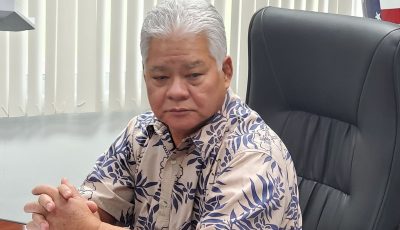Man gets 6 months for harboring illegal alien
The federal court handed down yesterday a six-month prison term on a man who admitted to harboring an illegal pregnant alien and exposed an alleged large-scale birth tourism business on Saipan.
After completing his sentence, Richard Peng will be placed on supervised release for one year.
U.S. District Court for the NMI Chief Judge Ramona V. Manglona ordered Peng to pay a $2,000 fine and $100 in court assessment fee, and perform 80 hours of community service.
Peng will remain free while a prison is still being chosen for him. Once his prison is designated, he may self-surrender to the U.S. Marshal Service.
For Manglona, Peng’s tale about an alleged large-scale birth tourism business on Saipan was just Peng’s way of minimizing his role in the scheme.
“You could have told your business partner ‘no’ but you participated. You actively assisted,” Manglona told Peng.
Manglona said it was a privilege for Peng to come to Saipan but what Peng did was straight out for profit. The baby the pregnant woman was carrying wasn’t even Peng’s, Manglona said .
“This is truly for profit,” she said.
In an interview after the hearing, defense counsel Michael Dotts said that Peng’s sentence was at the low end of the sentencing guidelines.
He said his client was given credit for his cooperation, quick guilty plea, and acceptance of responsibility.
Dotts said they argued that Peng was not just minimizing his role in the large-scale birth tourism business and that he was accepting responsibility.
Peng is a U.S. citizen who previously had a series of businesses.
In the sentencing memorandum, Peng, through Dotts, revealed that his former partner in a beef noodle restaurant organized the birth tourism business on the island.
Dotts said the initial plan to house pregnant Chinese women originated from Peng’s former business partner, who had been making his property on the island available to house pregnant Chinese women.
Peng, also known as Pai Peng and Tong-Long Peng, was charged in federal court with one count of harboring an illegal alien. The offense carries a maximum penalty of five years imprisonment.
Peng signed a plea deal with the U.S. government and pleaded guilty last Aug. 4.
Dotts said that Peng allowed a pregnant Chinese woman to continue to stay at his residence after the woman’s conditional parole expired, so she won’t be detected by immigration authorities.
Dotts said that Peng received RMB 50,000 from the Chinese woman.
The Chinese woman’s immigration status expired in November 2014 and she stayed at Peng’s house until February 2015.
Dotts said his client had no criminal record before this case.
The lawyer said Peng has accepted responsibility for his offense, and helped identify his former business partner for the Federal Bureau of Investigation.
Assistant U.S. attorney James J. Benedetto agreed with the defendant that a term of imprisonment of six months is “sufficient” but “not greater than necessary” to comply with the purposes of sentencing.
In the prosecution’s sentencing memorandum, Benedetto said the U.S. government believes that a six-month sentence would avoid any unwarranted sentencing disparity with others convicted of the same crime.
Benedetto as the defense memorandum and the pre-sentence investigation report point out, Peng has no criminal record, but has a “history of entrepreneurship.”
However, Benedetto said, the U.S. government agrees with the pre-sentence investigation prepared by the U.S. Probation Office that defendant is minimizing his role in the birth tourism operation he assisted.
The prosecutor said as the PSR points out, many of the facts being disputed were derived from the statements of the defendant himself.
“Given the apparent conflict between what defendant said to law enforcement officers previously and what he asserts now, the court should credit the former statements,” he said.
Benedetto said the former statements are more trustworthy, from an evidentiary standpoint, as they were closer in time to the events at issue, and against Peng’s interests.
Benedetto said the U.S. government believes the court should impose a sentence that prioritizes promoting respect for the law, just punishment, and personal deterrence.
Accordingly, he said, notwithstanding Peng’s attempts to minimize his role in birth tourism activities, the government agrees with the defense memo and the PSR that a sentence at the low end of the guideline range will promote those goals.



























